 If you’ve ever even so much as visited a bookmaker, played the lottery, had a game of bingo for money or been on a website of a company that offers betting or gaming in some shape or form then there’s a strong likelihood that you’ll have seen the name of the Gambling Commission at some point or another.
If you’ve ever even so much as visited a bookmaker, played the lottery, had a game of bingo for money or been on a website of a company that offers betting or gaming in some shape or form then there’s a strong likelihood that you’ll have seen the name of the Gambling Commission at some point or another.
Seeing the words isn’t the same as understanding what it is or how it influences the world of betting, however, so it’s only right that we take the time to explore exactly what the Commission is, how it came into being and why you might need to know about it if you tend to have a flutter every now and again.
If you’re looking for a brief and short summary then you’ll be interested to know that the non-departmental public body of the government takes on the responsibility of regulating gambling in the United Kingdom, including the likes of the National Lottery. It doesn’t have the responsibility for spread betting, which falls to the Financial Conduct Authority, nor of whether bookmakers should be allowed to open a shop on the high street or in a local area, which is the job of local authorities.
The main role of the UKGC is to ensure gambling: is safe, protects the vulnerable and under age, the industry is fair, honest and open, not used for criminal gains and customer funds are protected. Read on if you’d like to know more.
The Origins Of The Gambling Commission
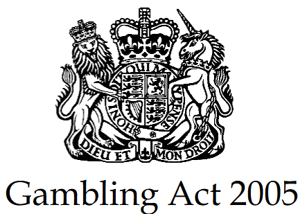 The gambling act of 1960 was pioneering in its time leading to legalisation of off-course betting, revolutionising the UK gambling industry and a big factor in turning us into a nation of bettors. By the new millennium however the act has become outdated and no longer reflected the changing nature of betting in the UK (read more about the history of gambling).
The gambling act of 1960 was pioneering in its time leading to legalisation of off-course betting, revolutionising the UK gambling industry and a big factor in turning us into a nation of bettors. By the new millennium however the act has become outdated and no longer reflected the changing nature of betting in the UK (read more about the history of gambling).
The Gambling Commission was created as part of the 2005 Gambling Act, which aimed to bring an increased sense of regulation to an industry that had been largely unregulated before then, at least in terms of the online world. The bill introduced the idea of companies needing to have a gambling licence in order to operate in the UK, with the Gambling Commission being created to issue and then administer said licences.
In order to understand the reason for, and impact of, the Gambling Commission, it’s firstly important to know what existed before it. The answer to that is ‘not much’. In a real sense, the majority of gambling in the UK was regulated by the Gaming Board of Great Britain. This can be seen as the front-runner to the Gambling Commission, having been established by the Gaming Act of 1968.
The Gaming Board of Great Britain was responsible for the regulation of casinos, bingo clubs and gaming machine suppliers. The aim of the Act was to keep gambling the UK free from the influence of criminal gangs and other nefarious characters. It did this by investigating any people or companies that hoped to enter the world of gaming, then monitoring how they acted once they were part of the industry.
The desire to look for something new in terms of regulating the industry had been around for some time before the 2005 Gambling Act came into being, as can be witnessed by a June 2000 report by the Comptroller and Auditor General entitled “The Gaming Board: Better Regulation”.
The introduction of the document outlined that it would ‘consider the scope for improving the Board’s regulatory functions’. The original Gaming Act of 1968, which didn’t really come into operation properly until 1970, had been given more scope over the years thanks to the likes of the Pool Competitions Act of 1971, the Lotteries Act of 1975 and the Lotteries and Amusements Act of 1976.
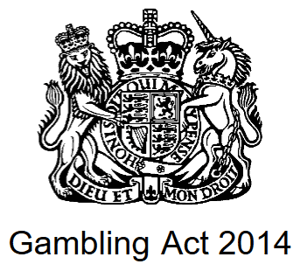 Even so, by the start of the new millennium the entire world of gambling was virtually unrecognisable from the one that had existed when the initial Act was introduced to parliament. The lawmakers couldn’t have even considered something like online gambling, which was in full swing by the time the 2005 Act came about. The new Act created the Gambling Commission and it took over the responsibility for regulating the likes of bingo halls, arcades, casinos, lotteries and slot machines, as well as betting in general.
Even so, by the start of the new millennium the entire world of gambling was virtually unrecognisable from the one that had existed when the initial Act was introduced to parliament. The lawmakers couldn’t have even considered something like online gambling, which was in full swing by the time the 2005 Act came about. The new Act created the Gambling Commission and it took over the responsibility for regulating the likes of bingo halls, arcades, casinos, lotteries and slot machines, as well as betting in general.
One of the biggest changes to the way that the Commission operated occurred in 2013, which was the year in which the National Lottery Commission was merged into it in order to put all types of gambling under the responsibility of the same entity. In 2014 the Gambling (Licensing and Advertising) Bill helped to tighten up the way that advertising was used by gambling companies to target UK citizens. As you’ll no doubt have inferred from the title of the 2014 Bill, this also brought in clearer legislation to the way that licensing happened, particularly with regards to remote gambling.
The 2014 Act declared that any company that wanted to advertise to British customers, whether online, on TV or via any other media, would need to first get a licence from the Gambling Commission. Nowadays all companies need to display their licence details on their website or clearly on their premises if they’re a bricks and mortar operator. You can also head to the Gambling Commission’s website and search for an operator’s licence details, if you think that will be easier or can’t find it any other way.
The 2014 Act also made gambling taxation fairer, by introducing a point of consumption tax for all companies accepting UK customers, no matter where they are based. For more detail about UK gambling licences and how they work see our dedicated guide.
The Role Of The UK Gambling Commission

The main aim of the Gambling Commission is to make betting and gambling in the UK as fair and safe as possible. The Commission regulates bingo operators, casinos, arcades, betting companies, companies that provide gaming machines, lottery operators, lottery managers, companies that provide gambling software and remote gambling operators for both online and phone based operations that either target a British audience or else use equipment based in Britain.
To get a better sense of what the Gambling Commission does, you might want to bear in mind its stated aims. These are to ‘keep crime out of gambling, to ensure that gambling is conducted fairly and openly, and to protect children and vulnerable people’. It does this by monitoring how companies work and operate, as well as issuing licences and levying fines if a company doesn’t fulfil its end of the bargain in terms of how it operates.
The Gambling Commission can make inspections of operators to which it has issued a licence, examining their financial activities and ensuring that everything is up to date. If something causes alarm then the Gambling Commission can recommend certain changes or amendments be made to the way that its licensees operate. If an operator isn’t performing or behaving how its supposed to then the Gambling Commission can do anything from issuing a warning through to revoking their licence, with fines also an option for the Commission.

The GC and gambling licenses also ensure customer deposits are ring fenced in case a betting brand collapses (see image above), there are various levels of cover from basic to high, you can read more about this in our dedicated article on what happens if a gambling company fails.
Examples Of Fines Levied By The Gambling Commission
 In 2018 William Hill was fined £6.2 million in the wake of a series of systematic failures, including failing to protect vulnerable players. In the same year, LeoVegas was issued with a fine of £600,000 after there were a number of self-exclusion fails and some adverts were deemed to be misleading.
In 2018 William Hill was fined £6.2 million in the wake of a series of systematic failures, including failing to protect vulnerable players. In the same year, LeoVegas was issued with a fine of £600,000 after there were a number of self-exclusion fails and some adverts were deemed to be misleading.
In June of 2018 it was revealed that a gambler had deposited £758,000 with 32Red over a period of more than two years. The customer only have a net income of a little in excess of £2,000 per month, yet 32Red failed to check that they could afford the bets that that were placing. As a result, the company was fined £2 million for failing to protect them.
Later in the same year Daub Alderney were also fined £7.1M for social responsibility and anti-money laundering failures. You can see therefore that the GC are a serious body who do take action and levy serious fines on a regular basis. Therefore you can be in no doubt that gambling is seriously regulated in the UK any any fraud or failures to protect customers are dealt with robustly. You can read about other gambling commission fines and actions in our responsible gambling guide.
What The Gambling Commission Does Not Do
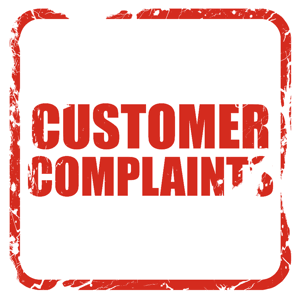 As a good rule of thumb, the Gambling Commission is responsible for the licensing and correct operation of companies that offer some form of gambling to UK-based customers. However, it can be just as important to be aware of what the Gambling Commission does not do as what it does do.
As a good rule of thumb, the Gambling Commission is responsible for the licensing and correct operation of companies that offer some form of gambling to UK-based customers. However, it can be just as important to be aware of what the Gambling Commission does not do as what it does do.
The first thing to realise that the Gambling Commission is not responsible for is dealing with consumer complaints. If you placed a bet with a bookmaker, online operator, on a gaming machine or with the National Lottery and you feel as though you’ve been cheated or not paid out on winnings then there’s no point turning to the Gambling Commission. The good news is that hope is not lost, however, with the Independent Betting Adjudication Service (IBAS) there for exactly that reason. See our guide to how to complain to a betting company for more
Another thing not handled by the Gambling Commission is legal advice for those that need it. Whether it’s consumers or businesses looking for ideas, you’d be barking up the wrong tree if you turned to them for that. What you can ask for is general information or advice about both the Gambling Act that created the Commission and how they approach their handling of given situations.
Not every single gambling website is regulated by the Gambling Commission either. A site that either advertises to or trades with British customers will need to have a licence issued to it by the Gambling Commission, but if it doesn’t tick either of those boxes then it might exist outside of the realm of the Gambling Commission. Obviously less reputable companies might also set themselves up without adhering to the Commissions rules and regulations, so they should be avoided in every instance as you will have zero legal protection if something bad happens (all sites we recommend are UK licensed for this reason).
In terms of advertising, it’s the Advertising Standards Authority that will deal with adverts that are felt to be inappropriate or misleading. The GC also are not involved in issuing of licences for premises, which is the responsibility of local licensing authorities. They same authorities will issue gambling operators with permits and register societies to allow them to hold a small lottery, for example.
As mentioned earlier the GC are not involved in regulating financial markets and any spread bets placed on markets or currencies, this falls under the umbrella of the FCA.
What Is A Gambling Licence
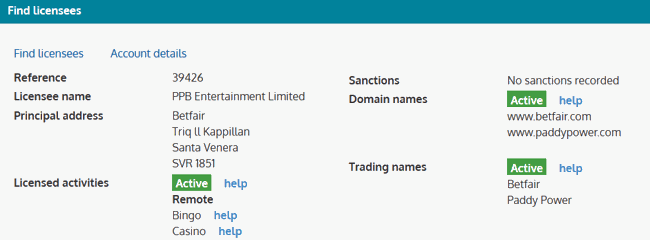
You’ve read about a gambling licence and the need for a company to have one several times now, but what is one and how does an operator get one? There are actually several different types of gambling licence that businesses can apply for, with some needing more than one to operate.
The License Conditions and Codes of Practice outlines the guidelines regarding licences. In order to get what, people must ensure that they offer fair and open gambling, that they will never exploit young or vulnerable people and that there is a system in place to help those vulnerable people. Again you can read more specifics in our licensing and law article.
There are eight categories of licence, speaking in broad terms. They are licences for:
- Arcades
- Bingo
- Casinos
- Betting
- Gambling Software Providers
- Gaming Machines
- Lottories and Funding
- Remote Gaming
How Much Does A Licence Cost?
As you might imagine, there are numerous factors that can influence how much a licence will cost. These include:
- Annual Gross Receipts
- Type Of Establishment
- Number Of Establishments
As an example, if you have a remote gambling site that lets punters have a flutter on horse racing and you earn more than £500,000 but less then £5 million then you’d end up paying £7,169. If, on the other hand, you operate betting shops that let punters bet on horse racing then it’s the number of shops that will dictate the fee.
The Future Of The Gambling Commission
 In 2017 the then Chief Executive of the Gambling Commission, Sarah Harrison, addressed the World Regulatory Briefing Conference about the direction that she thought the Gambling Commission was heading. Her ideas included the publishing of a forward strategy to help guide the Commission’s work in the future, as well as planned to help build consumer confidence and trust. There was also a hope that the Commission could review the online market and ensure that its control of it was as solid as possible.
In 2017 the then Chief Executive of the Gambling Commission, Sarah Harrison, addressed the World Regulatory Briefing Conference about the direction that she thought the Gambling Commission was heading. Her ideas included the publishing of a forward strategy to help guide the Commission’s work in the future, as well as planned to help build consumer confidence and trust. There was also a hope that the Commission could review the online market and ensure that its control of it was as solid as possible.
A strategy report for 2018 to 2021 acknowledged that the risks involved with gambling are ‘changing and evolving’, meaning that the Gambling Commission needs to adapt and evolve in order to deal with them. Given that more than 46% of people play the National Lottery, it was felt that it was important to ensure that it is run in a way that endure that everyone is protected, for example. It was also felt that confidence from the public in gambling was declining, meaning that something needed to be done to bring people back on board.
The Commission outlined several ways in which they could adapt and change to restore public confidence, including ensuring that they continued to be evidence led and independent. They also hoped to use their own knowledge to inform the public debate and to intervene when possible. They outlined five strategic priorities for this, which are:
- Protecting the interests of consumers
- Preventing harm to the public and consumers in general
- Raising the standards of the gambling market
- Optimising returns to good causes form the various lotteries under the Commission’s control
- Improve the way regulation works
The Commission publishes its finding twice a year, usually in May and November, which includes up-to-date reports with statistics on the industry. There’s also an archive on the Gambling Commission website that can be looked at.
Regulation By The Commission
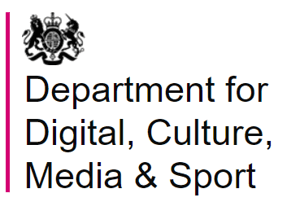 The Gambling Commission regulates gambling in four ways: licensing, compliance, enforcement of regulations and enforcement of criminality.
The Gambling Commission regulates gambling in four ways: licensing, compliance, enforcement of regulations and enforcement of criminality.
The emphasis obviously goes onto preventing the gambling industry doing things incorrectly or in a manner that’s not in the best interest of the consumer, but the Commission will use regulatory action against a licensee if they’re not obeying the rules of the licence.
Although independent the GC itself falls under the responsibility of the Department for Media, Culture and Sport, who can enact legislation through the commission.